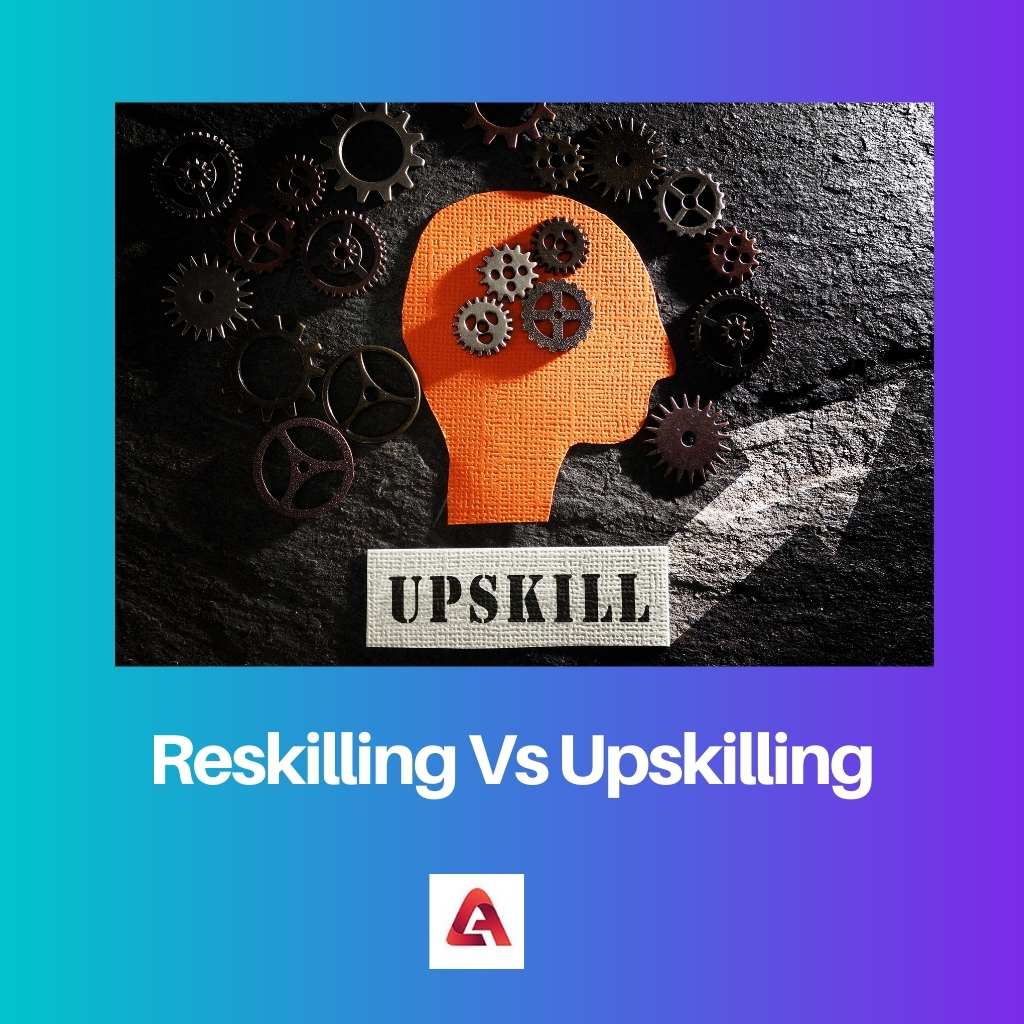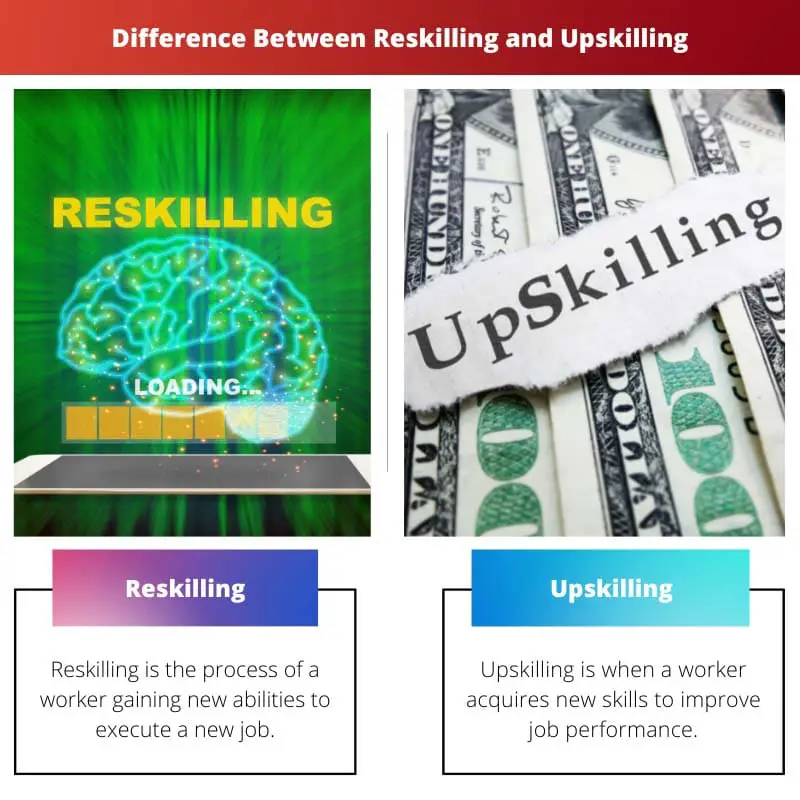Working towards a goal needs dedication, passion, and talent.
A person should understand their work and how to grow and excel in it, which necessitates skills that should be mastered or learned properly, and with the changing eras, these skills should be modified and new ones should be learned as learning never stops for a person’s growth and two of the skill-related factors are reskilling and upskilling.
Key Takeaways
- Reskilling involves learning new skills to transition into a different job or industry.
- Upskilling focuses on acquiring additional skills to improve one’s current job or role performance.
- Both strategies contribute to personal and professional development, but reskilling is more about adaptation while upskilling aims at enhancement.
Reskilling Vs Upskilling
Reskilling is related to the learning of new skills by a person. A person can learn new skills to perform a particular job. In reskilling, training is provided to the person to do a different job. Upskilling is the learning of new skills by employees to perform better in their current jobs. Cyber skills are an example of upskilling.

Reskilling is the method of training new abilities to perform a different job.
Reskilling can also refer to imparting a skill set to a worker in a corporate setting.
Corporations may be interested in reskilling a worker if they no longer require that employee’s skillset or the job a person holds becomes obsolete, but they still want to keep that worker.
Upskilling is the process of a worker discovering new skills to improve their job performance.
To adapt to changes in the business sector, an established advertising executive in a business, for example, may need to master digital advertising abilities.
In this case, the worker already has a great base and basic understanding and has to pick up just a few new skills to improve work performance.
Comparison Table
| Parameters of Comparison | Reskilling | Upskilling |
|---|---|---|
| Definition | Reskilling is the process of a worker gaining new abilities to execute a new job. | Upskilling is when a worker acquires new skills to improve job performance. |
| Skill | Employees acquire new abilities that are unrelated to their existing position. | Employees strengthen their present talents while also learning new ones that are relevant to their current position. |
| Career Change | A career change is anticipated for reskilling. | Upskilling does not always necessitate a professional move. |
| Necessity | To become employed in a new field, reskilling may necessitate the completion of many certificate programs – or even a degree. | Upskilling increases an employee’s worth by enhancing their skill set in the same career, thus no additional degrees are necessary. |
| Example | An accountant, for example, can reskill as a web developer. | Cyber skills, analytical skills, and organizational transformation skills are typical examples of upskilling initiatives. |
What Is Reskilling?
The acquiring of new abilities required to perform a completely different job is known as reskilling.
Reskilling seems to have become a term among agencies and organizations to assist employees who have been laid off to find new jobs.
However, it’s also necessary for businesses to fulfil their employment demands and thrive in a changing environment.
Individual employees can shift roles within their current firm or move to a different one via reskilling.
Retail store employees retraining as client service experts, warehouse workers retraining as robot mechanics, and accountants retraining as data analysts are examples of reskilling.
In 2020, 87 percent of managers, as per McKinsey & Company, expect skills gaps.
However, only around half of them seem to be confident in their ability to fix the issue.
Meanwhile, the World Economic Forum estimates that by 2025, upwards of 40% of workers worldwide will require reskilling.
Most people are unaware of how quickly things are changing.
Indeed, according to Gartner, 33% of the abilities listed in a typical 2017 job description will be obsolete by 2021.
For firms that respond swiftly, employees in no longer-existing roles represent a great reservoir of expertise prepared to be educated for other tasks.
The culture of their organization is already familiar to this personnel.
Furthermore, they may not be required to experience a lengthy onboarding procedure.
What Is Upskilling?
Upskilling is a method of acquiring different and original skills which are needed now and in the future.
Digital literacy, analytical skills, and organizational transformation skills are all popular uses of upskilling attempts.
Over the last few seasons, upskilling has grown increasingly important.
There seem to be various reasons for this, the most significant of which is the widening (digital) skills gap that many businesses are experiencing, the gap between what employers want or require their staff to accomplish and what those employees can effectively do.
The main causes of the current skills gap are as follows: A skills gap has emerged as a result of an ageing workforce.
For a long time, the baby boomer generation has been – and will continue to be – on the decline.
Naturally, this causes a hole, both in terms of difficult-to-fill available positions and in terms of lost skills and expertise.
A skills gap has emerged as a result of digitalization. The fourth industrial revolution is now taking place.
Machine learning, robotics, and other technological breakthroughs are rapidly changing the nature of the activities that must be completed and, as a result, the abilities required to perform those tasks.
Training and development, work rotation, expansion and enhancement, peer supervision and counselling, and outsourcing are all options for upskilling one’s employees.
Main Differences Between Reskilling and Upskilling
- Reskilling is the process of acquiring new skills to do a new job, whereas upskilling is the process of acquiring new skills to improve job performance.
- Employees who reskill acquire new skills that are unrelated to their current job. On the other hand, upskilling involves employees improving their ongoing skills while discovering new ones that apply to their current roles.
- Reskilling necessitates a job transition, whereas upskilling may not always entail a career change.
- To gain employment in a new sector, reskilling may require the completion of several certificate programs–or a degree–but upskilling boost an employee’s value by expanding their skill set in the same career. Therefore, no additional degrees are required.
- Accountants, for example, can reskill as web developers, whereas virtual skills, reasoning abilities, and organizational restructuring skills are all common examples of upskilling projects.

- https://digitalcommons.imsa.edu/cgi/viewcontent.cgi?article=1051&context=pres_pr
- http://lbsresearch.london.edu/id/eprint/1279/
